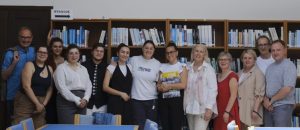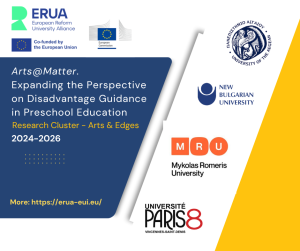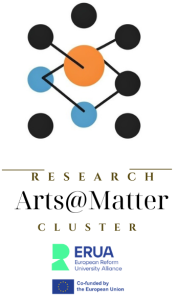
Research Impact of Arts@Matter (RIAM)
Integrated Research Symposium Cluster—A Two-Day Research Exchange
Dates: May 13-14, 2025
Location (in person & online): Department of Pre-School Education & Educational Design, School of Humanities, University of the Aegean, Rhodes, Greece
Overview
This intensive two-day symposium brings together education-engaged practice-researchers from diverse arts disciplines, including various research areas. The event creates a unique space for researchers working across different participatory, cultural, and community contexts to share experiences and methodologies. In addition, counseling within arts education research clusters significantly enhances the social impact of these initiatives. By promoting emotional well-being, mental health literacy, and social connectedness, counseling ensures that arts education is a transformative tool for individual and community development.
The Arts@Matter Research Cluster serves as a collaborative network that unites scholars, educators, and practitioners to explore the multifaceted impacts of the arts on both individual development and societal well-being. The Arts@Matter Research Cluster facilitates interdisciplinary research, fostering a comprehensive understanding of how arts education contributes to various social outcomes. It is dedicated to arts education, as it is instrumental in elucidating the profound social impacts of the arts by fostering interdisciplinary collaboration. The Arts@Matter Research Cluster not only advances academic knowledge but also informs policy and practice, ultimately contributing to a more equitable and culturally enriched society. Furthermore, special thematic axes aim to provide a comprehensive framework for exploring the intersection of distance and electronic learning with the arts, emphasizing interdisciplinary collaboration, social impact, and educational innovation. The Arts@Matter Research Cluster is included among the Research Clusters formed around the specified main ERUA thematic area: Arts & Edges
Description of research activity: ERUA Research Clusters engage in interdisciplinary collaboration, fostering interactions among researchers from various academic disciplines and fields of expertise. Through such an approach, ERUA aims to enable a comprehensive exploration of different thematic areas and the generation of innovative solutions.
During the symposium, we will explore:
- The role of specific crafts/disciplines in socially engaged research
- Definitions and terminology in socially engaged/participatory arts research
- Stakeholder involvement in the research process
- Challenges in practice-based research
- Research methodologies and methods
- Contexts and roles within participatory research
- Ethical considerations
- Methods of analysis
- Relevant approaches to dissemination
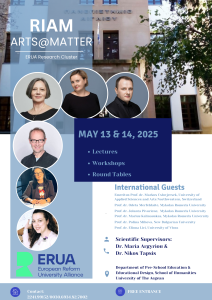
Following the successful completion of RIAM 2025, we are pleased to invite you to submit the full version of your presented paper for consideration as a chapter in a forthcoming edited volume to be published by IGI Global, entitled Early Childhood Education as a European Knowledge Ecosystem: Arts, Digital Transformation, and Social Futures. The volume will be indexed in Scopus and constitutes an official scholarly outcome of our recent collaboration and academic exchange developed through RIAM 2025. The edited volume builds directly on the thematic, methodological, and conceptual foundations of the symposium, aiming to extend the dialogue initiated at RIAM 2025 into a coherent, high-quality, peer-reviewed publication. Contributions are expected to be substantially developed full chapters, aligned with the scope of the volume and the standards of international academic publishing. All submitted manuscripts will undergo a double-blind peer review process, in accordance with the editorial policies of IGI Global. Papers presented at RIAM 2025 are considered particularly relevant to the aims and thematic orientation of the volume. Detailed information regarding the book’s scope, recommended topics, chapter guidelines, formatting instructions, and submission procedures is available in the official Call for Chapters: https://www.igi-global.com/publish/call-for-papers/call-details/9628
Key Dates
Proposal Submission Deadline: March 1, 2026
Full Chapter Submission Deadline: May 3, 2026
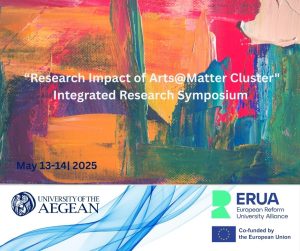
Publication of Peer-Reviewed Symposium Proceedings with Individual DOIs: We are pleased to announce the upcoming publication of the proceedings from the RIAM symposium, which will be held on May 13-14 at the Department of Pre-School Education & Educational Design, University of the Aegean, Rhodes, Greece. This publication will represent a significant contribution to the field of Arts Research, featuring a collection of peer-reviewed articles based on the symposium themes. The proceedings will showcase cutting-edge research and insightful discussions presented during the symposium. Each article will undergo a rigorous double-blind peer-review process, ensuring academic excellence and scholarly rigor. To facilitate accessibility and citation, each article will be assigned a unique Digital Object Identifier (DOI).
Key Features of the Publication:
- Peer-Reviewed Content: All articles will be rigorously reviewed by experts in the field.
- Individual DOIs: Each article will be assigned a unique DOI for easy citation and retrieval.
- Online Availability: The proceedings will be available online at https://www.pse.aegean.gr/riam-seminar/
This publication serves as a valuable resource for researchers, academics, and practitioners interested in the latest developments in the arts, inclusion, and vulnerable groups. We believe it will contribute significantly to the ongoing discourse and advancement of knowledge in this domain. The RIAM symposium is an international forum that brings together researchers, academics, and practitioners to exchange ideas and discuss the latest advancements in the Arts@Matter ERUA Cluster and beyond.
Special Thematic Axes for the Interdisciplinary Approach to Distance and E-Learning: Socioeconomic and Cultural Dimensions with Integration of the Arts
Cultural Diversity and Inclusion in Digital Learning Spaces
- Exploring how digital learning can accommodate diverse cultural identities and promote intercultural understanding.
- Integrating artistic expressions to enhance cultural representation and inclusivity in electronic learning content.
- Assessing the potential of the arts to foster cross-cultural dialogue and collaboration in virtual classrooms.
Pedagogical Innovations and Artistic Integration
- Investigating interdisciplinary pedagogical approaches that combine digital technologies with artistic practices.
- Developing and evaluating online curricula that incorporate music, visual arts, theater, and other creative disciplines.
- Examining the role of arts-based learning in enhancing critical thinking, creativity, and emotional intelligence in remote learning settings.
Technological Innovations and Artistic Tools
- Exploring the use of digital tools and platforms that facilitate artistic creation and interaction in online learning.
- Assessing the potential of virtual reality (VR), augmented reality (AR), and multimedia applications to enhance artistic engagement in distance learning.
- Investigating the ethical implications and challenges of integrating advanced technologies in arts-based education.
Cultural Policy, Educational Frameworks, and the Arts
- Analyzing the role of cultural policies in shaping the integration of the arts into distance and electronic learning.
- Exploring national and international educational frameworks that support interdisciplinary approaches to digital learning.
- Advocating for policy reforms that prioritize arts education and digital inclusion in remote learning strategies.
Research, Evaluation, and Evidence-Based Practices
- Conducting empirical research to assess the impact of arts integration on learning outcomes in distance education.
- Developing metrics and evaluation frameworks to measure the effectiveness of interdisciplinary approaches in digital learning.
- Identifying best practices and scalable models for integrating the arts into electronic learning environments.
The common research reference axes include:
- Advancement of Academic and Cognitive Skills
- The role of arts education in developing critical thinking, problem-solving abilities, and academic performance.
- Empirical studies show the correlation between engagement in arts programs and enhanced cognitive skills.
- The relationship between arts education and higher levels of social engagement in academic settings.
- Social and Emotional Development
- The impact of arts education on emotional regulation, empathy, and interpersonal skills.
- The integration of counseling within arts education to support social-emotional learning (SEL).
- How arts-based learning enhances students’ resilience and well-being.
- Social Connectedness and Community Engagement
- The contribution of arts-related activities to fostering social cohesion.
- The role of the arts in building strong community networks and encouraging participation in social initiatives.
- The effectiveness of arts-based interventions in promoting dialogue around societal challenges.
- Mitigation of Social Inequities
- The ability of arts education to address disparities and provide marginalized communities with avenues for self-expression.
- The impact of arts education on reducing stress and promoting well-being among disadvantaged children.
- The role of inclusive arts programs in achieving equitable educational outcomes.
- Cultural Awareness and Inclusivity
- The use of the arts to promote multicultural understanding and reduce prejudices.
- The role of interdisciplinary research in developing culturally inclusive arts curricula.
- The potential of arts education to foster intercultural dialogue and collaboration.
- Mental Health and Emotional Expression
- The role of arts-integrated counseling in improving mental health literacy.
- How artistic activities provide therapeutic benefits, supporting emotional expression and coping strategies.
- The significance of arts-based interventions in reducing psychological distress and fostering emotional well-being.
- Interdisciplinary Integration of Arts in Digital Learning
- The intersection of technology and the arts in distance learning environments.
- The use of virtual reality (VR), augmented reality (AR), and digital platforms for creative expression.
- The ethical and educational implications of digital tools in arts-based education.
- Cultural Policy, Educational Frameworks, and Arts-Based Learning
- The role of policy in shaping the integration of the arts in digital and distance learning environments.
- National and international educational strategies supporting interdisciplinary approaches in digital learning.
- Advocacy for policy reforms prioritizing digital inclusivity and arts education.
- Research, Evaluation, and Evidence-Based Practices
- Empirical research assessing the impact of arts integration in digital learning.
- The development of standardized evaluation metrics to measure learning outcomes in arts-based education.
- Best practices and scalable models for incorporating the arts in distance and electronic learning.
Research axes collectively provide a structured foundation for interdisciplinary exploration in arts education, highlighting its societal impact, pedagogical relevance, and policy implications.
Who Should Apply? We welcome applications from education-engaged arts practice researchers—defined as researchers who explore questions and topics through collaborative, culturally engaged, and participatory practices. The symposium is open to: PhD students, graduates, pre-graduated students, independent researchers, early-career researchers, and experienced researchers.
Format & Participation: The symposium will host up to 60 participants. While there is no registration fee, participants are responsible for their own travel, accommodation, and meal costs.
Application Process: Deadline: April 11, 2025 – Selection notifications will be sent by April 27, 2025
To submit an announcement/interactive presentation, please complete the FORM
- Research Cluster Coordinator: Dr. Maria Argyriou, Laboratory Teaching Staff, Applied Music Pedagogy, Department of School Education & Educational Design, School of Humanities, University of The Aegean, Demokratias Str. 1, Building “7th March,” Rhodes 85 132, Room 17 (ground floor), tel.: +30.22410.99152, email: m.argyriou@aegean.grCo-Clusterr Researcher: Dr. Nikolaos Tapsis, Laboratory Teaching Staff, V irtualy Reality in Education, email: tapsis@aegean.gr
Include the following information:
- Full Name:
- Institutional Affiliation (if applicable)
- Current Professional Role(s)
- Primary Arts Discipline(s) (Please list your main areas of artistic practice. For example: Visual Arts, Music, Theatre, Dance, Literature, Film, etc.)
- Current Project Description (in 250 words or fewer, please describe your current project, including its aims, methods, and expected results). You may include relevant web links.
- Motivation for Participation (maximum 50 words)
- Key Question/Topic for Discussion (Please state the main question or topic you would like to discuss during the event)
Find out more about ERUA Clusters and this particular “Arts@Matter. Expanding the Perspective on Disadvantage Guidance in Preschool Education: https://erua-eui.eu/research-activities/research-clusters/


Find out more about our research partners (universities, research centers & facilitators):
- Mykolo Romerio Universitetas (LITHUANIA)
- Universitat Autònoma de Barcelona, Catalunya (SPAIN)
- New Bulgarian University (BULGARIA)
- Department of Education, Faculty of Humanities, University “Ismail Qemali”, Vlora (ALBANIA)
- University of Patras (GREECE)
- Research Group iMUSED – Department of Didactics of Physical Education, Artistic and Musical Education, Universitat de València (SPAIN): The research group specialises in artistic education, with a particular focus on multimodal learning and music pedagogy. Their work explores the educational and social dimensions of music in diverse learning contexts. More info: https://www.uv.es/uvweb/research-service/en/research-groups/group-1285949714098.html?p2=GIUV2020-483
- UR Scènes du monde – Université Paris 8 (FRANCE): An interdisciplinary research unit exploring globalised and intercultural artistic practices. It is housed within the Faculty of Arts, Philosophy, and Aesthetics and engages critically with questions of performance, representation, and aesthetics. More info: https://www.univ-paris8.fr/UR-Scenes-du-mondeÉcole Doctorale Esthétique, Sciences et Technologies des Arts (EDESTA) – Université Paris 8 (FRANCE). EDESTA is a leading doctoral school fostering advanced research in aesthetics, art theory, and artistic technologies. It serves as a hub for researchers exploring the intersections of art, society, and digital media. More info: https://edesta.univ-paris8.fr/
- Dr Luna Xinlu Zheng – University College London (UNITED KINGDOM)
- Directorate of Primary Education, Corinth (GREECE): A regional educational authority overseeing the implementation of national educational policies at the primary level. The Directorate actively supports initiatives related to inclusion, innovation, and teacher training in schools.
- Directorate of Secondary Education, Dodecanese (GREECE): Responsible for coordinating and supervising secondary education in the Dodecanese region, this Directorate engages in programmes promoting intercultural education, digital transformation, and community outreach.
